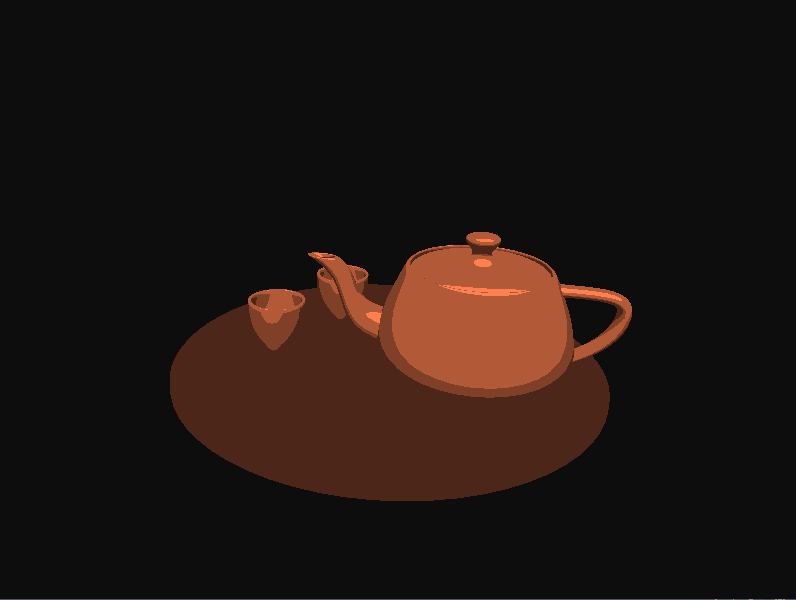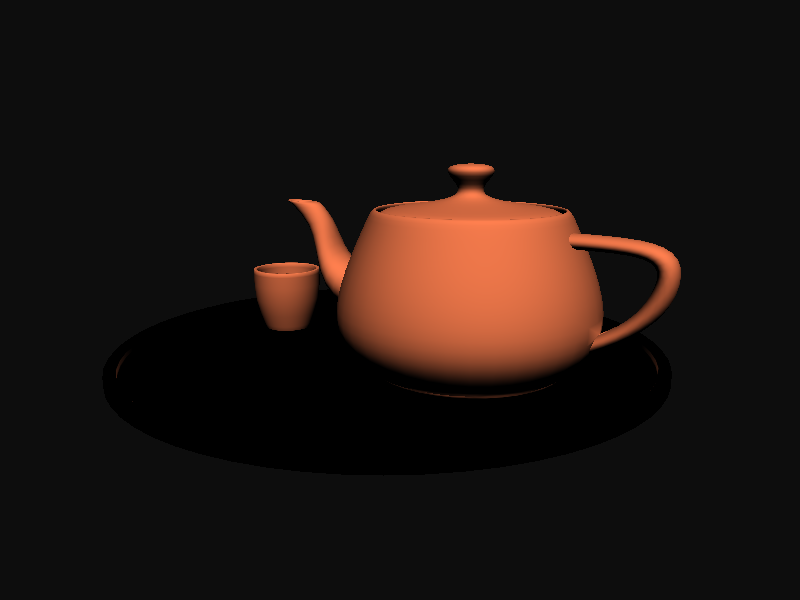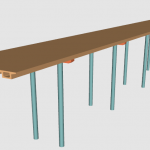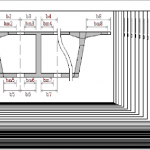
OpenGL-卡通着色(Cartoon)
原理
茶壶上的色调通过角度的余弦值来选择的,这个角度是指光线和面的法线之间的夹角角度。如果法线和光的夹角比较小,我们使用较亮的色调,随着夹角变大,逐步使用更暗的色调。换句话说,角度余弦值将决定色调的强度。
关于计算,主要根据diffuse的值得区间富赋予不同颜色,使之产生过渡的颜色效果。当diffuse的值大于0.95,使用最亮的颜色,当diffuse的值小于0.25,使用最暗的颜色。
vec3 color;
if (diff > 0.95)
color = vec3(1.0, 1.0, 1.0);
else if (diff > 0.5)
color = vec3(0.7, 0.7 ,0.7);
else if (diff > 0.25)
color = vec3(0.5, 0.5, 0.5);
else
color = vec3(0.3, 0.3, 0.3);
vec3 diffuse = color * lightColor;
非卡通效果

CartoonShading.vs
#version 330 core
layout (location = 0) in vec3 aPos;
layout (location = 1) in vec3 aNormal;
out vec3 FragPos;
out vec3 Normal;
uniform mat4 model;
uniform mat4 view;
uniform mat4 projection;
void main()
{
FragPos = vec3(model * vec4(aPos, 1.0));
Normal = mat3(transpose(inverse(model))) * aNormal;
gl_Position = projection * view * vec4(FragPos, 1.0);
}
CartoonShading.fs
#version 330 core
out vec4 FragColor;
in vec3 FragPos;
in vec3 Normal;
uniform vec3 lightDir;
uniform vec3 lightColor;
uniform vec3 objectColor;
void main()
{
// diffuse
vec3 norm = normalize(Normal);
vec3 lightDir = normalize(-lightDir);
float diff = max(dot(norm, lightDir), 0.0);
vec3 color;
if (diff > 0.95)
color = vec3(1.0, 1.0, 1.0);
else if (diff > 0.5)
color = vec3(0.7, 0.7 ,0.7);
else if (diff > 0.25)
color = vec3(0.5, 0.5, 0.5);
else
color = vec3(0.3, 0.3, 0.3);
vec3 diffuse = color * lightColor;
vec3 result = diffuse * objectColor;
FragColor = vec4(result, 1.0);
}
main.cpp
#include <glad/glad.h>
#include <GLFW/glfw3.h>
#include <glm/glm.hpp>
#include <glm/gtc/matrix_transform.hpp>
#include <glm/gtc/type_ptr.hpp>
#include <learnopengl/shader_m.h>
#include <learnopengl/camera.h>
#include <learnopengl/model.h>
#include <iostream>
void framebuffer_size_callback(GLFWwindow* window, int width, int height);
void mouse_callback(GLFWwindow* window, double xpos, double ypos);
void scroll_callback(GLFWwindow* window, double xoffset, double yoffset);
void processInput(GLFWwindow *window);
// settings
const unsigned int SCR_WIDTH = 800;
const unsigned int SCR_HEIGHT = 600;
// camera
Camera camera(glm::vec3(0.0f, 4.0f, 15.0f));
float lastX = SCR_WIDTH / 2.0f;
float lastY = SCR_HEIGHT / 2.0f;
bool firstMouse = true;
// timing
float deltaTime = 0.0f;
float lastFrame = 0.0f;
int main()
{
// glfw: initialize and configure
// ------------------------------
glfwInit();
glfwWindowHint(GLFW_CONTEXT_VERSION_MAJOR, 3);
glfwWindowHint(GLFW_CONTEXT_VERSION_MINOR, 3);
glfwWindowHint(GLFW_OPENGL_PROFILE, GLFW_OPENGL_CORE_PROFILE);
#ifdef __APPLE__
glfwWindowHint(GLFW_OPENGL_FORWARD_COMPAT, GL_TRUE);
#endif
// glfw window creation
// --------------------
GLFWwindow* window = glfwCreateWindow(SCR_WIDTH, SCR_HEIGHT, "CartoonShader", NULL, NULL);
if (window == NULL)
{
std::cout << "Failed to create GLFW window" << std::endl;
glfwTerminate();
return -1;
}
glfwMakeContextCurrent(window);
glfwSetFramebufferSizeCallback(window, framebuffer_size_callback);
glfwSetCursorPosCallback(window, mouse_callback);
glfwSetScrollCallback(window, scroll_callback);
// tell GLFW to capture our mouse
//glfwSetInputMode(window, GLFW_CURSOR, GLFW_CURSOR_DISABLED);
// glad: load all OpenGL function pointers
// ---------------------------------------
if (!gladLoadGLLoader((GLADloadproc)glfwGetProcAddress))
{
std::cout << "Failed to initialize GLAD" << std::endl;
return -1;
}
// configure global opengl state
// -----------------------------
glEnable(GL_DEPTH_TEST);
// build and compile shaders
// -------------------------
Shader ourShader("CartoonShading.vs", "CartoonShading.fs");
// load models
// -----------
Model ourModel("resources/objects/TeapotGlass/teapot_n_glass.obj");
// draw in wireframe
//glPolygonMode(GL_FRONT_AND_BACK, GL_LINE);
// render loop
// -----------
while (!glfwWindowShouldClose(window))
{
// per-frame time logic
// --------------------
float currentFrame = static_cast<float>(glfwGetTime());
deltaTime = currentFrame - lastFrame;
lastFrame = currentFrame;
// input
// -----
processInput(window);
// render
// ------
glClearColor(0.05f, 0.05f, 0.05f, 1.0f);
glClear(GL_COLOR_BUFFER_BIT | GL_DEPTH_BUFFER_BIT);
// don't forget to enable shader before setting uniforms
ourShader.use();
ourShader.setVec3("objectColor", 1.0f, 0.5f, 0.31f);
ourShader.setVec3("lightColor", 1.0f, 1.0f, 1.0f);
ourShader.setVec3("lightDir", -0.2f, -10.0f, -10.0f);
// view/projection transformations
glm::mat4 projection = glm::perspective(glm::radians(camera.Zoom), (float)SCR_WIDTH / (float)SCR_HEIGHT, 0.1f, 100.0f);
glm::mat4 view = camera.GetViewMatrix();
ourShader.setMat4("projection", projection);
ourShader.setMat4("view", view);
// render the loaded model
glm::mat4 model = glm::mat4(1.0f);
model = glm::rotate(model, (float)glfwGetTime(), glm::vec3(0.5f, 1.0f, 0.0f));
model = glm::translate(model, glm::vec3(0.0f, 0.0f, 0.0f)); // translate it down so it's at the center of the scene
model = glm::scale(model, glm::vec3(1.0f, 1.0f, 1.0f)); // it's a bit too big for our scene, so scale it down
ourShader.setMat4("model", model);
ourModel.Draw(ourShader);
// glfw: swap buffers and poll IO events (keys pressed/released, mouse moved etc.)
// -------------------------------------------------------------------------------
glfwSwapBuffers(window);
glfwPollEvents();
}
// glfw: terminate, clearing all previously allocated GLFW resources.
// ------------------------------------------------------------------
glfwTerminate();
return 0;
}
// process all input: query GLFW whether relevant keys are pressed/released this frame and react accordingly
// ---------------------------------------------------------------------------------------------------------
void processInput(GLFWwindow *window)
{
if (glfwGetKey(window, GLFW_KEY_ESCAPE) == GLFW_PRESS)
glfwSetWindowShouldClose(window, true);
if (glfwGetKey(window, GLFW_KEY_W) == GLFW_PRESS)
camera.ProcessKeyboard(FORWARD, deltaTime);
if (glfwGetKey(window, GLFW_KEY_S) == GLFW_PRESS)
camera.ProcessKeyboard(BACKWARD, deltaTime);
if (glfwGetKey(window, GLFW_KEY_A) == GLFW_PRESS)
camera.ProcessKeyboard(LEFT, deltaTime);
if (glfwGetKey(window, GLFW_KEY_D) == GLFW_PRESS)
camera.ProcessKeyboard(RIGHT, deltaTime);
}
// glfw: whenever the window size changed (by OS or user resize) this callback function executes
// ---------------------------------------------------------------------------------------------
void framebuffer_size_callback(GLFWwindow* window, int width, int height)
{
// make sure the viewport matches the new window dimensions; note that width and
// height will be significantly larger than specified on retina displays.
glViewport(0, 0, width, height);
}
// glfw: whenever the mouse moves, this callback is called
// -------------------------------------------------------
void mouse_callback(GLFWwindow* window, double xposIn, double yposIn)
{
float xpos = static_cast<float>(xposIn);
float ypos = static_cast<float>(yposIn);
if (firstMouse)
{
lastX = xpos;
lastY = ypos;
firstMouse = false;
}
float xoffset = xpos - lastX;
float yoffset = lastY - ypos; // reversed since y-coordinates go from bottom to top
lastX = xpos;
lastY = ypos;
camera.ProcessMouseMovement(xoffset, yoffset);
}
// glfw: whenever the mouse scroll wheel scrolls, this callback is called
// ----------------------------------------------------------------------
void scroll_callback(GLFWwindow* window, double xoffset, double yoffset)
{
camera.ProcessMouseScroll(static_cast<float>(yoffset));
}
完整项目代码
https://github.com/mc-liyanliang/OpenGL-Shader/tree/master





